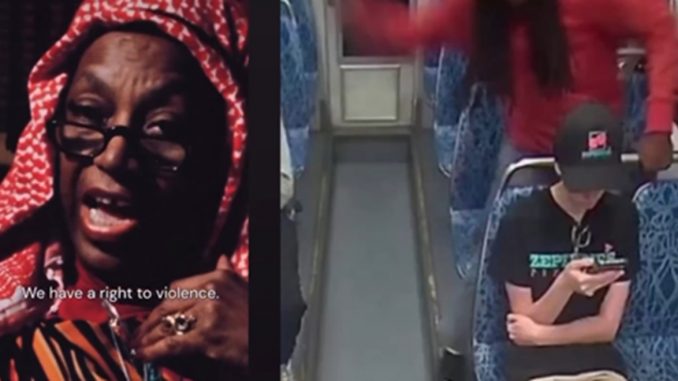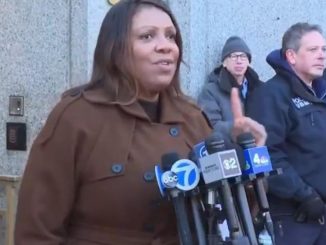
Published September 10, 2025
The Black Lives Matter official Instagram account has shared a reel asserting that “oppressed people have a right to violence,” as public fury boils over the recent stabbing murder of Ukrainian refugee Iryna Zarutska in Charlotte, North Carolina.
BLM’s Instagram Post Sparks Outrage After Charlotte Train Stabbing
A Story of Violence, Timing, and National Debate
The tragic killing of 23-year-old Ukrainian refugee Iryna Zarutska in Charlotte last month has already shaken the nation. But a new controversy has now erupted—this time over a post from the official Black Lives Matter Instagram account, which critics say dangerously glorified violence at the worst possible moment.
The Post That Ignited the Storm
On September 9, just one day after video footage of Zarutska’s brutal stabbing became public, BLM’s verified Instagram account shared a reel quoting from the 1983 feminist film Born in Flames.
The clip featured the line:
“Right to violence. All oppressed people have a right to violence… It’s like your right to pee. You gotta have the right place, gotta have the right time.”
The reel appeared as a temporary Instagram Story—available for only 24 hours—but screenshots and recordings quickly spread across social media.
For critics, the timing was impossible to ignore. The post landed amid raw emotions following Zarutska’s death at the hands of DeCarlos Dejuan Brown Jr., a man with a long arrest record who has since been charged with federal crimes that could carry the death penalty.
BREAKING – The official black lives matter account has posted a video stating that black people “have a right to violence” amid mass outrage over the slaying of Iryna Zarutska at the hands of a black male in Charlotte, North Carolina. pic.twitter.com/jhnuArvrXd
— Right Angle News Network (@Rightanglenews) September 10, 2025
The Charlotte Tragedy
On August 22, Zarutska boarded a Charlotte light rail train, only to be fatally stabbed in front of passengers and surveillance cameras. The chilling footage shows her final moments, which have since circulated online.
Brown, 35, was arrested after leaving the train. Authorities later revealed his troubled past, with multiple run-ins with the law. Federal prosecutors are now seeking maximum charges.
Her death has sparked national grief and a bitter debate about crime, race, and media coverage. Some commentators—including Elon Musk and Piers Morgan—have accused mainstream outlets of downplaying the story because the victim was white and the suspect was Black.
Reactions to the BLM Post
The BLM reel only poured fuel on the fire. Conservative voices framed it as proof that the movement encourages violence rather than peace.
-
The Gateway Pundit described the post as “incendiary,” accusing BLM of glorifying violence against whites.
-
Daily Caller confirmed the Story’s existence, emphasizing that the lines quoted from the movie sounded like a direct justification of violent resistance.
On social media, outrage came swiftly. Critics blasted the movement for insensitivity, with some accusing BLM of tacitly excusing violent crime.
Yet defenders argue the post was taken out of context. They note that the reel used a line from a decades-old film, meant as social commentary on oppression, not as a literal endorsement of violence in today’s context.
A Question of Intent vs. Perception
The controversy highlights a recurring problem in America’s fractured media landscape: intent versus interpretation.
-
Intent: The BLM account may have sought to spark dialogue about systemic oppression using a cultural reference.
-
Perception: Given the timing—within 24 hours of Zarutska’s stabbing—the post was widely interpreted as inflammatory, even celebratory of violence.
With no clarifying statement yet from BLM, the narrative has been shaped almost entirely by public reaction and political spin.
 Implications
Implications
-
BLM’s Messaging Fuels Division
-
Posting rhetoric about a “right to violence” in the wake of a brutal killing implies tolerance—or even encouragement—of lawlessness.
-
Instead of calling for peace and justice, BLM appears to amplify narratives that justify chaos.
-
-
Media Double Standards
-
The limited coverage of Zarutska’s murder underscores what critics call a “media blackout” when crimes don’t fit preferred narratives.
-
If the racial roles had been reversed, the story would likely dominate national headlines.
-
-
Policy Failures and Public Safety
-
The suspect’s long criminal record reflects systemic failures where repeat offenders are not properly dealt with, putting innocent citizens at risk.
-
Calls for leniency and reduced policing clash with the harsh reality of rising violent crime.
-
-
Victims Over Politics
-
Zarutska’s story highlights how victims can be sidelined when their suffering doesn’t align with activist or political agendas.
-
Right-leaning voices argue that all victims—regardless of race—should receive equal recognition and justice.
-
-
National Security and Immigration Angle
-
As a Ukrainian refugee, Zarutska came to America seeking safety—only to be killed on public transit.
-
This fuels broader concerns about whether U.S. leaders are prioritizing citizen and immigrant safety or indulging in ideological battles.
-
Broader Implications
The uproar raises difficult questions:
-
Should activist groups weigh timing more carefully when sharing provocative messages?
-
Is quoting art or film enough to shield groups from accountability for how their message is received?
-
Does media framing deepen racial divisions, or does it expose uncomfortable truths?
For now, Zarutska’s death remains the central tragedy, but the BLM post has become a flashpoint in the larger national conversation about race, violence, and justice.
 Overall Takeaway:
Overall Takeaway:
The Charlotte stabbing was not just another crime—it was a brutal reminder of what happens when failed policies, media silence, and activist double standards collide. While a young woman lost her life in broad daylight, BLM’s decision to circulate rhetoric about a “right to violence” sends a chilling message about where the movement’s priorities lie.
Americans deserve justice, security, and truth—not excuses for violence or selective coverage that hides uncomfortable realities. If the nation is serious about protecting innocent lives, it must reject dangerous narratives, hold criminals accountable, and demand that every victim—not just the politically convenient ones—receives a voice.
SOURCES: THE GATEWAY PUNDIT – WATCH: BLM’s Official Account Posts Video Saying Black People ‘Have a Right to Violence’ Amid National Outrage Over Iryna Zarutska Stabbing





Be the first to comment